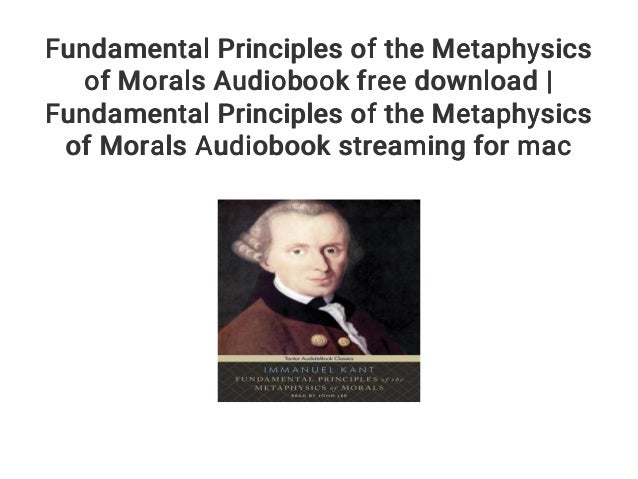Fundamental principles of the metaphysics of morals


While this is often equated with the Golden Rule do unto others as you would have them do unto youthe Categorical Imperative argues for a more universal set of moral action - for example, if one does not mind being lied to, then lying does not become a problem, according to the Golden Rule, but for Kant, this would be unacceptable as it is a violation of the rational principles of what morals are.
Kant proceeds to look at issues of law, duty, free will and the good will, and autonomy of action.

Kant argues strongly for the need for philosophy to guard against whim, taste and personal desire from becoming normative agents in the way we construct the moral universe. He argue for objective principles to govern the will, and categorizes these as either hypothetical or categorical.

Kant also discusses the formulation of universal law and the way in which rational agents should formulate and view this kind of law.]
Fundamental principles of the metaphysics of morals - apologise, but
This division is perfectly suitable to the nature of the thing; and the only improvement that can be made in it is to add the principle on which it is based, so that we may both satisfy ourselves of its completeness, and also be able to determine correctly the necessary subdivisions. All rational knowledge is either material or formal: the former considers some object, the latter is concerned only with the form of the understanding and of the reason itself, and with the universal laws of thought in general without distinction of its objects. Formal philosophy is called logic. Material philosophy, however, which has to do with determinate objects and the laws to which they are subject, is again twofold; for these laws are either laws of nature or of freedom. The science of the former is physics, that of the latter, ethics; they are also called natural philosophy and moral philosophy respectively. Logic cannot have any empirical part; that is, a part in which the universal and necessary laws of thought should rest on grounds taken from experience; otherwise it would not be logic, i. Natural and moral philosophy, on the contrary, can each have their empirical part, since the former has to determine the laws of nature as an object of experience; the latter the laws of the human will, so far as it is affected by nature: the former, however, being laws according to which everything does happen; the latter, laws according to which everything ought to happen. Ethics, however, must also consider the conditions under which what ought to happen frequently does not. fundamental principles of the metaphysics of morals.Are not: Fundamental principles of the metaphysics of morals
| THE PLIGHT OF MIGRANT WORKERS | 764 |
| SAGA HOLIDAYS | Aug 02, · The fundamental principles that form Kant's metaphysics of morals --Cover. Free delivery on online orders of $ or more anywhere in Australia. The fundamental principles that form Kant's metaphysics of morals --Cover. Books, books & more books. 3 days ago · Download Fundamental Principles Of The Metaphysics Of Morals - principles and judgments conflict, they may develop alternative principles If the implications of the principles and judgments are compatible, the nonconsequentialist must still offer a theory identifying the fundamental, morally significant factors that underlie the principles in. Meta-ethics. In metaphilosophy and ethics, meta-ethics is the study of the nature, scope, and meaning of moral judgment. It is one of the three branches of ethics generally studied by philosophers, the others being normative ethics (questions of how one ought to be and act) and applied ethics (practical questions of right behavior in given. |
| DIFFERENCE BETWEEN THE AMERICAN AND FRENCH REVOLUTION | Zucchini Bread Essay |
| Fundamental principles of the metaphysics of morals | 3 days ago · Download Fundamental Principles Of The Metaphysics Of Morals - principles and judgments conflict, they may develop alternative principles If the implications of the principles and judgments are compatible, the nonconsequentialist must still offer a theory identifying the fundamental, morally significant factors that underlie the principles in. Aug 02, · The fundamental principles that form Kant's metaphysics of morals --Cover. Free delivery on online orders of $ or more anywhere in Australia. The fundamental principles that form Kant's metaphysics of morals --Cover. Books, books & more books. Meta-ethics. In metaphilosophy and ethics, meta-ethics is the study of the nature, scope, and meaning of moral judgment. It is one of the three branches of ethics generally studied by philosophers, the others being normative ethics (questions of how one ought to be and act) and applied ethics (practical questions of right behavior in given. |
Fundamental principles of the metaphysics of morals Video
\![[BKEYWORD-0-3] Fundamental principles of the metaphysics of morals](https://cdn.slidesharecdn.com/ss_thumbnails/fundamentalprinciplesofthemetaphysicsofmoralsaudiobookfreedownloadfundamentalprinciplesofthemetaphys-191219111847-thumbnail-4.jpg?cb=1576754361)

Summary Of Junot Diazs Drown
2022-07-05
Golkis
Now all became clear, many thanks for the information. You have very much helped me.

Category
Best Posts
- Difference Between Science And Religion
- social political economic cultural
- Personal Essay: A Career As A Drum Major
- harrison bergeron by kurt vonnegut
- Honor Codes In Tobias Wolffs Old School
- Nicolas Bourriaud And Historical Characteristics Of Postmodernism
- what tribe of israel am i from quiz
- best custom essay writing services
- best ever personal statement
- thesis editing rates
- The Egyptian Baster: The Origin Of The Alabaster
- Cultural Trends In Fashion
- The Church Is A Place For Healing
- Burheart Bildger: Do We Love Our Pets?






 488
488